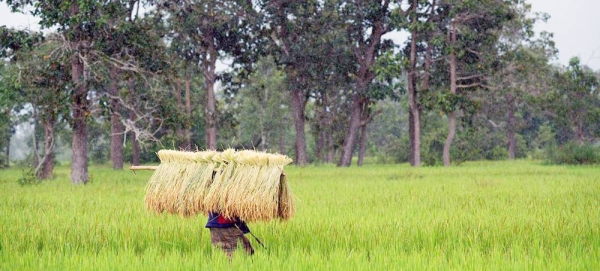
Native wildflower meadows will line the verges of all new large-scale road projects under an initiative by Highways England, the Guardian can reveal.
Nodding blue harebells, clusters of yellow kidney vetch and flashes of bird’s-foot-trefoil could soon become the norm on stretches of the road network in England with the infrastructure provider committing to the creation of biodiverse grasslands as standard on all new major schemes.
The UK has lost 97% of its wildflower meadows since the 1930s, and the move could create substantial areas of rare habitat along hundreds of miles of motorways and A-roads for pollinators such as bees, bats and birds.
Under the new low nutrient grasslands policy, Highways England contractors will be obliged to create conditions for species-rich grasslands to thrive using low fertility soils with chalk and limestone bases. The verges will then be allowed to regenerate naturally or be seeded with wildflowers.
The approach also limits the potential for aggressive grasses, dock and nettle to overpower wildflowers, which regularly happens on verges covered in topsoil, often requiring intensive cutting regimes.
The decision follows the success of projects like the Weymouth Relief Road in Dorset, where native wildflowers have thrived on chalk verges. The area is now home to half of the butterflies in the UK, including the small blue, Britain’s smallest. The roadsides require minimal maintenance, and large sections have not been cut in 10 years since wildflower seeds were sown, which has also reduced costs.
“Verges will look different under this approach. They’ll be a lot more natural looking. It wouldn’t just be rye grass. It’s going to be more varied and colourful. And hopefully a lot more vibrant,” said Ben Hewlett, Highways England environmental adviser.
“It’s potentially hundreds of miles of new schemes. There’ll be all over the country and provide ecological connectivity across the network.”
Highways England said the new policy would only apply to larger new projects at first – around 300 miles of road – but the company aims to extend the initiative to pre-existing roads.
While the policy change by Highways England only involves the creation of wildflower meadows using low fertility soils, the company said it was also altering mowing regimes to promote biodiversity on parts of the road network it manages.
Phil Sterling, a programme manager with Butterfly Conservation , who sowed the seeds on the Weymouth Relief Road a decade ago, said the new policy was a significant change of approach.
“It’s encouraging that Highways England have seen the light and followed this lead,” he said. “Butterflies need linked habitats across landscapes to reverse their declines and Highways England are now on the path to achieving this on all their new schemes.”
The conservation charity Plantlife has produced best practice guidelines for councils and road mangers – including Highways England – and several councils have started adopting the changes in their verge management regime. In addition to using low fertility soils, the guidelines recommend changes to mowing that allow wildflowers to bloom and seed.
“Our research shows that nearly half of our entire flora grows on our verges, making this an exceptionally important habitat for wildlife, which needs all the help it can get,” said Kate Petty, Plantlife’s Road Verge Campaign Manager.
One of the few happy accidents of the spring lockdown was that wildflowers were able to bloom on roadsides as the pandemic forced maintenance teams to stay at home. An explosion of colour followed across the UK, and the vision of what could be inspired many members of the public, said Petty.
“For lots of people, verges have been mown so often that they are just a green thicket that has been abandoned, or it’s something that’s mown within an inch of its life each year,” she said. “For people to have the time to slow down a bit and see those plants go through their life cycle, it helped them see there’s this wonderful showcase of flowers on their doorstep.”
While the Green Party welcomed the change by Highways England, deputy leader Amelia Womack cautioned the move was not and alternative to tackling the country’s reliance on cars and stopping the building of new roads.
“The UK is one of the most nature-deprived nations on Earth and so any initiative to improve our biodiversity is, of course, welcome,” she said. “However, creating wildflower verges by the side of roads is no substitute for taking the more serious action that is needed if we are to tackle the nature and climate crises we currently face.”












